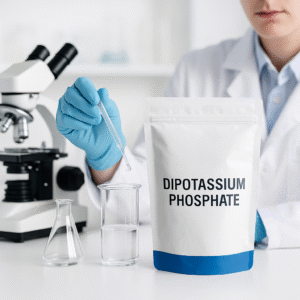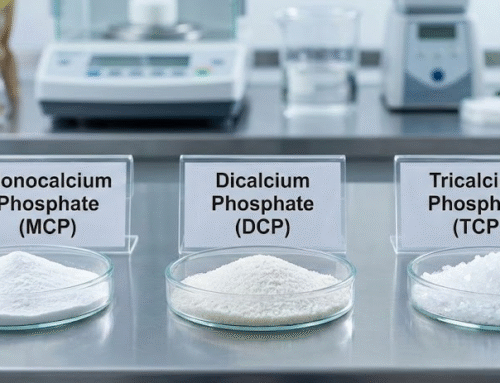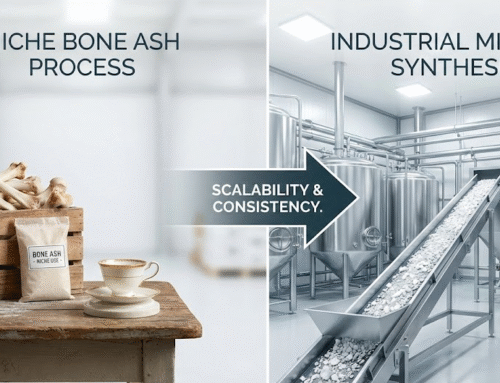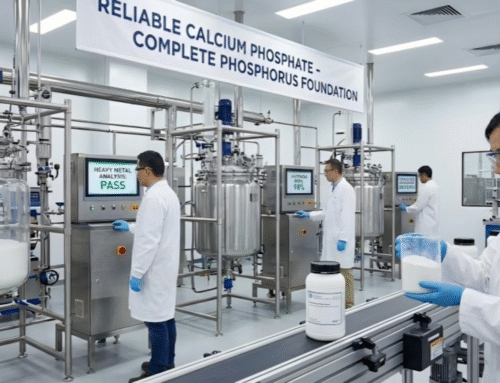Food grade dipotassium phosphate (DKP, E340(ii)) is widely used as a pH regulator, buffering agent, stabilizer and potassium source in beverages, dairy, bakery and nutrition products.
1) Why Food Manufacturers Demand Higher Quality DKP
In food and beverage formulations, food-grade dipotassium phosphate plays several roles at once:
- pH regulator & buffering agent: stabilizes acidity and flavor profile.
- Stabilizer: helps maintain physical stability and prevents separation.
- Nutrient source: provides a bioavailable source of potassium.
Even small deviations in purity, heavy metals, insoluble matter or solubility can quickly cause visible and sensory defects in finished products:
- Cloudiness or turbidity in otherwise clear beverages.
- Sediment or floating particles at the bottom of the bottle.
- Metallic, bitter or off-flavors that consumers immediately notice.
- pH drift over shelf life, affecting taste and stability.
- Non-compliance with food regulations and export requirements.
In short, when food factories purchase DKP, the most important factor is not “cheap price”, but
reliable and consistent quality control.
2) Five Core Quality Indicators Purchasing Must Check
These five parameters are the core quality indicators purchasing and QA teams use to evaluate the performance,
stability and compliance of food-grade DKP.
2.1 Assay (Main Content ≥ 98–99%)
A high assay of food-grade dipotassium phosphate ensures:
- More accurate formulation and pH control.
- Better buffering effect at the same dosage.
- Lower levels of organic and inorganic impurities.
Recommended specification: Assay ≥ 99% for food-grade DKP whenever possible.
2.2 Iron, Arsenic, and Heavy Metals
Food manufacturers are especially sensitive to heavy metals and trace elements. Even low levels can have visible
and regulatory impact:
- Elevated iron: can cause yellowing or discoloration in clear beverages.
- Lead, arsenic, cadmium: directly affect safety and compliance.
- Export markets: may apply stricter heavy metal limits than domestic regulations.
A serious DKP supplier will:
- Provide a Certificate of Analysis (COA) for every batch.
- Offer third-party test reports on request.
- Demonstrate compliance with GB, FCC and EU standards.
2.3 Water Solubility and Clarity
For food-grade DKP, solubility is not just a number on paper—it is a highly visible quality parameter in real
production:
- DKP should dissolve quickly in process water.
- The solution should be free of undissolved particles.
- The solution should be optically clear, especially for beverage use.
Beverage factories are particularly sensitive: a single undissolved speck can trigger a full investigation,
recall discussions, or consumer complaints.
2.4 pH Stability in the Target Application Range
The buffering performance of dipotassium phosphate directly influences:
- Overall taste and acid–sweet balance.
- Texture and viscosity in dairy and protein drinks.
- Stability of color and flavor over shelf life.
Purchasing and quality teams should confirm that the DKP product maintains consistent behavior in the typical
pH range of:
Target stability range: approximately pH 4.5–9.0, depending on the finished product.
2.5 Insoluble Matter & Other Impurities
Excessive insoluble matter leads to:
- Visible precipitation or sedimentation in drinks.
- Cloudiness in clear beverages or syrups.
- Gritty mouthfeel in powders and instant products.
- Unpredictable interactions with stabilizers or flavors.
Food plants usually prefer DKP with:
Water-insoluble matter: typically less than 0.1% for high-quality food-grade products.
3) Common DKP Application Pain Points (and How to Solve Them)
The following pain points are frequently reported by food factories. For purchasing managers, understanding both
the root cause and the solution helps in supplier selection and technical communication.
Pain Point 1: Unstable pH Control
Why it happens: inconsistent purity, interfering metal ions, or large batch-to-batch variation.
Solution: select DKP with controlled metals and verified batch consistency (< 0.2% on key parameters), supported by clear COA records.
Pain Point 2: Cloudiness or Sediment in Beverages
Why it happens: excessive insoluble matter, heavy-metal interference, or incompatibility with gums, proteins or acids in the formula.
Solution: use high-purity, fast-dissolving DKP with low insolubles, and request compatibility testing plus optimized dissolution procedures (water temperature, mixing time, addition sequence).
Pain Point 3: Uncertainty About Export Compliance
Why it happens: different markets (China, US, EU, etc.) apply different limits for Pb, As, Cd and other contaminants.
Solution: choose DKP that meets GB 25559, FCC and E340(ii) simultaneously, with a full regulatory dossier (COA plus third-party test reports) and suppliers experienced in export to your target countries.
Pain Point 4: Slow Dissolution on the Production Line
Why it happens: coarse or uneven particle size, moisture caking during storage, or insufficient mixing conditions.
Solution: specify a fast-dissolving DKP grade with controlled particle size, improve agitation and tank design, and ensure packaging and storage prevent moisture pick-up.
4) How to Evaluate the Real Strength of a DKP Supplier
Beyond basic price and delivery terms, purchasing and QA teams should evaluate whether a supplier can support
long-term, stable supply of food-grade dipotassium phosphate.
Below are four dimensions you can use directly in internal checklists or on your own website when describing your capabilities.
① Stable Raw Material System
Reliable DKP quality starts with consistent upstream phosphate and potassium sources. Strong suppliers maintain
long-term raw material stability to ensure predictable performance and secure supply.
② Automated, Controlled Production Process
Modern, automated DKP production offers tighter control of crystallization, particle size and impurity levels,
resulting in more consistent solubility and purity for food applications.
③ Every Batch Tested: COA + Third-Party Support
In the food industry, trust is built on documentation. Each batch of DKP should be accompanied by a COA including
heavy-metal data, with third-party verification available for key export markets.
④ Technical & Application Support
Beyond supplying product, a capable DKP partner supports lab trials, pH and stability evaluations, compatibility
checks with other ingredients, and flexible packaging and documentation for different markets.
5) Typical Food Applications of Food-Grade DKP
Food-grade dipotassium phosphate (DKP) is used in beverages, dairy, powders, bakery and nutrition
products for pH control, buffering, stabilization and potassium enrichment. The table below summarizes typical
applications and key quality requirements.
| Application | Function of DKP | Key Quality Requirements |
|---|---|---|
| Carbonated and still beverages | pH control, buffering, potassium source | Very high clarity, low metals, fast dissolution |
| Dairy drinks & plant-based beverages | Buffering, protein stability, mineral balance | Low insolubles, stable pH, good compatibility |
| Instant powders & solid drinks | pH adjustment, taste optimization, potassium fortification | Fast dissolution, no gritty particles, low moisture |
| Bakery & premixes | pH control, yeast activity modulation | Consistent assay, low impurities, stable performance |
| Functional & nutritional products | Potassium source, buffering | Food-grade documentation, strict heavy-metal limits |
6) FAQ: Key Questions from DKP Purchasing Managers
Q1: What is the difference between food-grade and industrial-grade DKP?
Food-grade DKP has much stricter controls on heavy metals, insoluble matter, microbiological limits, and production hygiene.
Industrial-grade DKP is not suitable for any food or beverage application and may not comply with GB, FCC, or EU standards.
Q2: Can food-grade dipotassium phosphate be supplied on a long-term basis?
A reliable supplier should be able to demonstrate:
- Monthly or annual production capacity for DKP.
- Standard lead times and safety stock strategies.
- Experience with long-term contracts and forecast-based planning.
Q3: Is OEM or private-label packaging possible?
Many food factories and distributors require:
- Custom bag designs or private labels.
- Different pack sizes (e.g., 20 kg, 25 kg, or small industrial packs).
- Palletized export packaging according to destination requirements.
A flexible DKP manufacturer should be able to support these needs within agreed minimum order quantities.
Q4: How can GJ Phosphate support our DKP sourcing?
As a specialized phosphate supplier, GJ Phosphate can provide:
- Food-grade dipotassium phosphate with controlled assay, metals and insolubles.
- Consistent batch quality, supported by COAs and optional external test reports.
- Samples and technical support for your beverage, dairy, or powder projects.
- Flexible packaging and export-ready logistics solutions.
Disclaimer: The information in this article is for technical and commercial guidance only.
Always refer to local regulations, product standards and your internal QA requirements when finalizing ingredients and specifications.





